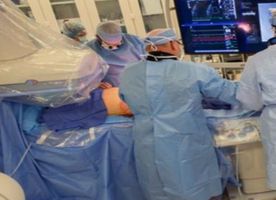Coronary Artery Bypass Graft (CABG) Surgery in Thailand
Search and Compare the Best Clinics and Doctors at the Lowest Prices for Coronary Artery Bypass Graft (CABG) Surgery in Thailand






Coronary Artery Bypass Graft (CABG) Surgery at Sikarin Hospital in Bangkok, Thailand





Coronary Artery Bypass Graft (CABG) Surgery at Bangkok Hospital Phuket in Phuket, Thailand





Coronary Artery Bypass Graft (CABG) Surgery at Thonburi Bamrungmuang Hospital in Bangkok, Thailand





Coronary Artery Bypass Graft (CABG) Surgery at Bangkok Hospital Bangkok in Bangkok, Thailand





Coronary Artery Bypass Graft (CABG) Surgery at Thainakarin Hospital in Bangkok, Thailand




Coronary Artery Bypass Graft (CABG) Surgery at Thonburi Hospital in Bangkok, Thailand



Coronary Artery Bypass Graft (CABG) Surgery at Kasemrad Bangkae Hospital in Bangkok, Thailand





Coronary Artery Bypass Graft (CABG) Surgery at Bumrungrad International Hospital in Bangkok, Thailand
Our partner clinics in are accredited by the following associations












































































































































No Time?
Tell us what you're looking for and we'll reach out to the top clinics all at once
WHY US?












































































































































No Time?
Tell us what you're looking for and we'll reach out to the top clinics all at once


What does a Coronary Artery Bypass Graft (CABG) Surgery Procedure Involve?
Broadly, this intricate procedure involves the rerouting of blood around congested or constricted coronary arteries, thereby improving the heart's blood and oxygen supply. The procedure starts with the application of general anesthesia, which is then followed by a surgical cut made in the chest area by the surgeon. The harvested blood vessel or graft is subsequently connected both above and beneath the blocked artery, allowing for an alternate blood flow around the obstruction. The procedure demands an immense degree of expertise and accuracy, and the success of the execution determines the heart's health directly.
How Long Should I Stay in Thailand for a Coronary Artery Bypass Graft (CABG) Surgery Procedure?
When it comes to how long you might stay in Thailand for a Coronary Artery Bypass Graft (CABG) Surgery Procedure, it generally depends on individual healing speed and the advice of the medical professional. Following the surgery, hospital stay ranges usually from 5 to 7 days. However, total recuperation may require 12 weeks or possibly longer, during this time, adequate rest, appropriate nutrition, and mild physical activity should be your priority. Adhering to the post-surgery care plan provided by your healthcare provider is of utmost importance.
What's the Recovery Time for Coronary Artery Bypass Graft (CABG) Surgery Procedures in Thailand?
The recovery period for a Coronary Artery Bypass Graft (CABG) Surgery in Thailand can fluctuate, depending on factors like your general wellbeing, the success of the operation, and the level of adherence to post-operative care. Typically, you might need to stay in the hospital for a week after the procedure. Once you are released, the complete recovery process can take anything from six to twelve weeks. During this time, a diet beneficial to heart health, maintaining mild activity levels, and regular check-ins with your healthcare professional are essential. The secret to a fruitful recovery lies in achieving a balance between physical activities, balanced diet, and adequate rest.
What sort of Aftercare is Required for Coronary Artery Bypass Graft (CABG) Surgery Procedures in Thailand?
After undergoing a Coronary Artery Bypass Graft (CABG) Surgery in Thailand, post-operative care forms a crucial segment of the recovery journey. This care generally encompasses pain management and clot prevention medication, modification towards a heart-beneficial lifestyle, and cardiac rehabilitation. The latter is a custom program incorporating exercise sessions, educational information on heart-friendly living, and therapeutic guidance to mitigate stress. This forms a vital part of your recovery process, assisting in revitalizing strength, halting any progression of your condition, and lowering the chances of future cardiac issues.
What's the Success Rate of Coronary Artery Bypass Graft (CABG) Surgery Procedures in Thailand?
Generally, the Coronary Artery Bypass Graft (CABG) Surgery boasts high success rates in Thailand. Numerous patients witness substantial enhancement in their symptoms and overall quality of life post-surgery. Factors like the patient's general health status, the degree of heart disease, the competency and experience of the surgeon, and the patient's dedication to necessary lifestyle adjustments post-surgery contribute to influencing the success rates. However, it's critical to note that while the procedure may alleviate symptoms, it doesn't act as a cure for the heart ailment. Persisting with a heart-friendly lifestyle is instrumental in ensuring enduring success.
Are there Alternatives to Coronary Artery Bypass Graft (CABG) Surgery Procedures in Thailand?
Although Coronary Artery Bypass Graft (CABG) Surgery is frequently employed to address severe coronary heart disease, alternative treatments are available based on the unique characteristics of your condition. These alternatives may encompass medications, alterations in lifestyle, and less invasive procedures such as angioplasty and stenting. Medications can aid in lowering blood pressure, decreasing cholesterol levels, and minimizing the risk of blood clot formation.
Angioplasty and stenting procedures can unclog congested arteries, facilitating smoother blood circulation to the heart. However, these alternate non-surgical methods may not be the best fit for every patient. Thus, engaging in a discussion over the optimum treatment approach for your specific condition with your healthcare provider is indispensable.
This information has been accurately sourced and verified by a medical professional for its accuracy, however, we strongly recommend you to consult with your doctor before pursuing medical procedures overseas.


